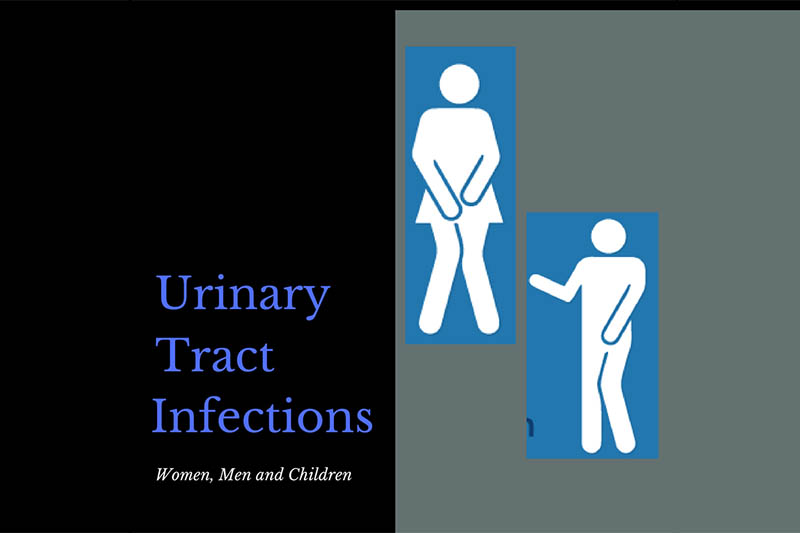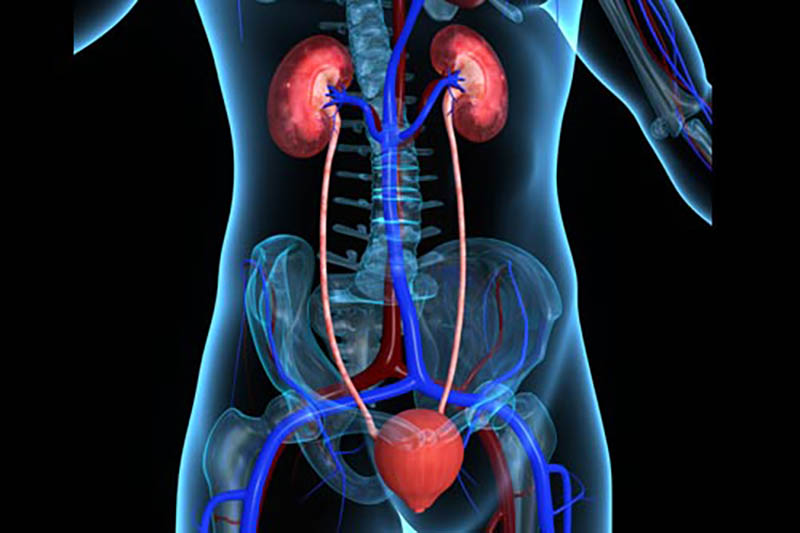
What are UTI’s? Urinary Tract Infections
Do you… Frequently or urgently need to urinate Often only pass small amounts of urine Have Pain or burning sensation when urinating These can be symptoms of urinary tract infections. There

Urinary tract infections are caused when bacteria enter the urinary tract and multiply, leading to infection in the ureters, bladder, urethra, or kidneys. The bacteria which cause UTI’s usually enter the urinary system through the urethra, but can also less commonly enter through the bloodstream. The most common bacteria to cause UTI’s is the E.coli bacteria, which is usually spread to the urethra from the anus.
A urinary tract infection can occur anywhere in the urinary system. The kidneys control the amount of water in the blood and act to filter out waste products to form urine. Each kidney has a tube called a ureter, which joins each individual kidney to the bladder. Urine leaves the kidneys through the ureters and enters the bladder, where it causes the urge to urinate and results in the urine leaving the body through the urethra.
The urinary system is designed to prevent serious infection in the kidneys by preventing the urine from flowing back up to the kidneys from the bladder, and therefore keeping most infections confined to the bladder or urethra. Usually, UTI’s aren’t too serious and will either go away by themselves or can be treated by a course of antibiotics. In some cases, however, if a UTI is left untreated bacteria may find a way to travel back up into the kidneys and cause infection. This can result in kidney damage, scarring, and failure, along with possible blood poisoning. Blood poisoning can occur when the infection moves from the kidneys into the bloodstream.
There are different types of urinary tract infections. These include
In the case of kidney infections:
Symptoms in children:
Some people are at higher risk for developing UTI’s. These include
A doctor will perform a physical exam, which includes taking a urine sample and sending it for testing. To prevent bacterial contamination, the doctor may instruct you wipe your genital area with an antiseptic pad and that you catch the urine midstream. If a patient is unable to obtain a clean catch sample, their doctor may have to obtain a sample via catheterization. This involves placing a thin tube (catheter) into the urethra to drain the urine from the bladder.
Sometimes lab analysis is followed by a urine culture. This will tell the doctor what bacteria is causing the infection and which medications will be the most effective.
If you are experiencing frequent UTI’s, or in the case of a UTI in an infant/child, the doctor may consider it to be due to an abnormality in the urinary tract and may create images of your urinary tract through ultrasound, computerized tomography (CT), intravenous pyelogram (IVP) or magnetic resonance imaging (MRI).
In the case of recurrent UTI’s the doctor may perform a cystoscopy which involves using a long, thin tube with a lens to see inside the urethra and bladder.
If the doctor suspects an upper tract UTI (ureters, or kidneys) is the cause, they may also need to do a complete blood count and blood cultures in addition to the urine tests. The blood culture will determine if the infection has made it into the blood stream.
Depending on the symptoms sexually active women may require a pelvic examination as pelvic infections have similar symptoms to UTI’s. Men may require genital examination and sometimes a prostate examination. A prostate infection requires a longer course of antibiotics than a UTI.
Antibiotics are the usual form of treatment for urinary tract infections. The medications prescribed depend on the individual’s health condition and the type of bacteria found in the urine.
Medications most commonly used for simple urinary tract infections include Trimethoprim/sulfamethoxazole (Bactrim, and Septra), Fosfomycin (Monurol), Nitrofurantoin (Macrodantin, and Macroboid), Cephalexin (Keflex), and Ceftriaxone.
In the case of complicated UTI’s a doctor may prescribe a group of medications known as Fluoroquinolones (Ciprofloxacin, and Levofloxacin amongst others). These medications are not generally used to treat simple urinary tract infections as the risks and negative effects outweigh the benefits of treating these conditions.
Often the symptoms of a UTI clear up within the first few days of taking the antibiotics, but it is important to take the entire course as prescribed.
Your doctor may also prescribe a pain medication (analgesic) to help with the pain, and works to numb the bladder and urethra to relive the burning sensation from urinating.
Treatments for recurrent urinary tract infections may include
Severe UTI’s may require intravenous antibiotic treatment in hospital, or an injection of antibiotics, followed by 10 – 14 days of oral antibiotics.
In the case of viral or fungal infections, the doctor may prescribe an antiviral medication such as cidofovir, or an antifungal medication.


Urinary tract infections in children can indicate other more serious conditions such as urinary reflux which causes the bladder valve to not work properly, resulting in the urine flowing back to the kidneys, therefore increasing the risk of a kidney infection.
This condition can permanently damage the kidney and also result in scarring, high blood pressure, toxaemia in pregnancy, and kidney failure.
Men are much less likely to develop UTI’s than women. This is due to the fact that their urethra is 8 inches long, while women have urethras with a length of 4cm.
For men to develop a UTI, a lot of things have to go wrong as they are not easily infected by a simple exposure to the E.coli bacteria like women are. UTI’s in men are considered “complicated” and need to be thoroughly evaluated.
Doctors will usually obtain a urine sample and check the lower tract (prostate and urethra), and upper urinary tract (kidneys and bladder) in case of: stones or tumours that may obstruct urine flow, prostate enlargement, and malformations or birth defects. Chronic bacterial prostatitis is a risk factor for UTI’s in men.

If treating a urinary tract infection at home, be aware there are certain health risks associated with this, for example, the treatment doesn’t work and the infection spreads to the kidneys which can be life-threatening. If UTI symptoms have not diminished or completely disappeared after 1 – 2 days, you should immediately consult a doctor.
Cranberry juice and cranberry supplements should not be used in conjunction with blood-thinning drugs such as warfarin, or NSAID’s such as aspirin.
D-Mannose only works for UTI’s caused by the bacteria E.coli and can cause side effects such as diarrhoea, gastrointestinal tract issues, bladder irritation symptoms, skin rash and itchiness, dizziness, and potentially high-risk side effects in CDG (congenital disorders of glycosylation) patients as these disorders disrupt intermediary mannose metabolism.
You should always consult a doctor before taking any form of supplementation, especially when in conjunction with other medications.

Do you… Frequently or urgently need to urinate Often only pass small amounts of urine Have Pain or burning sensation when urinating These can be symptoms of urinary tract infections. There
Disclaimer – Our intent is not to diagnosis but to offer information on therapy choices and practitioners. Information on this site is intended general educational purposes only. Any statements made are carefully referenced and any information, products or services discussed are not intended to diagnose, cure, treat or prevent any disease or illness. Please consult a healthcare practitioner before making a choice.